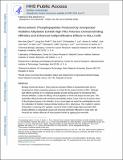Mono-anionic phosphopeptides produced by unexpected histidine alkylation exhibit high plk1 polo-box domain-binding affinities and enhanced antiproliferative effects in hela cells
Author(s)
Qian, Wen-Jian; Park, Jung-Eun; Lai, Christopher C.; Kelley, James A.; Park, Suk-Youl; Lee, Ki Won; Lee, Kyung S.; Burke, Terrence R.; Lim, Daniel Cham-Chin; Yaffe, Michael B; ... Show more Show less
DownloadYaffe_Mono-anionic.pdf (845.8Kb)
OPEN_ACCESS_POLICY
Open Access Policy
Creative Commons Attribution-Noncommercial-Share Alike
Terms of use
Metadata
Show full item recordAbstract
Binding of polo-like kinase 1 (Plk1) polo-box domains (PBDs) to phosphothreonine (pThr)/phosphoserine (pSer)-containing sequences is critical for the proper function of Plk1. Although high-affinity synthetic pThr-containing peptides provide starting points for developing PBD-directed inhibitors, to date the efficacy of such peptides in whole cell assays has been poor. This potentially reflects limited cell membrane permeability arising, in part, from the di-anionic nature of the phosphoryl group or its mimetics. In our current article we report the unanticipated on-resin N(τ)-alkylation of histidine residues already bearing a N(π)- alkyl group. This resulted in cationic imidazolium-containing pThr peptides, several of which exhibit single-digit nanomolar PBD-binding affinities in extracellular assays and improved antimitotic efficacies in intact cells. We enhanced the cellular efficacies of these peptides further by applying bio-reversible pivaloyloxymethyl (POM) phosphoryl protection. New structural insights presented in our current study, including the potential utility of intramolecular charge masking, may be useful for the further development of PBD-binding peptides and peptide mimetics.
Date issued
2014-11Department
Massachusetts Institute of Technology. Department of Biological Engineering; Massachusetts Institute of Technology. Department of Biology; Koch Institute for Integrative Cancer Research at MITJournal
Biopolymers
Publisher
Wiley Blackwell
Citation
Qian, Wen-Jian et al. “Mono-Anionic Phosphopeptides Produced by Unexpected Histidine Alkylation Exhibit High plk1 Polo-Box Domain-Binding Affinities and Enhanced Antiproliferative Effects in Hela Cells: Antiproliferative Effects in HeLa Cells.” Biopolymers 102.6 (2014): 444–455.
Version: Author's final manuscript
ISSN
0006-3525
1097-0282